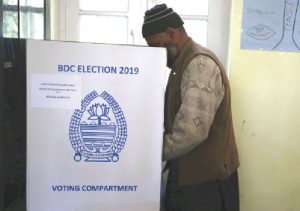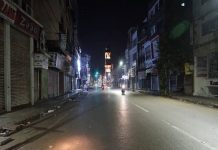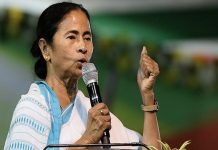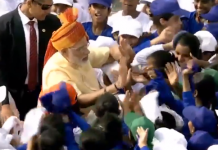 On October 24, as J&K held Block Development Council elections, its first electoral exercise following the revocation of Article 370, major mainstream parties like National Conference, the PDP and Congress boycotted. The BJP was the only major party contesting the election.
On October 24, as J&K held Block Development Council elections, its first electoral exercise following the revocation of Article 370, major mainstream parties like National Conference, the PDP and Congress boycotted. The BJP was the only major party contesting the election.
As many as 1,065 elected panchayat members tried their luck in the first-ever BDC polls, the second-tier of panchayats, in Jammu, Kashmir and Ladakh for 283 BDC seats. Only BJP and Panthers Party had fielded their candidates officially. There were at least 853 Independent candidates in the fray.
There were a total of 316 BDCs, including 147 in Jammu region, 136 in Kashmir and 31 in Ladakh. Elections were announced for 310 BDCs, of which 27 chairpersons have been elected unopposed. The government granted 33 per cent reservation for women, besides the Scheduled Castes. A total of 105 BDCs were reserved for women.
There are around 39,000 panches and sarpanches across the state. In the Valley alone, there are 19,578 panches and sarpanches. After the conclusion of the election, the government is set to establish District Development Boards to complete the three-tier Panchayat System in the Union Territories. They are Halqa Panchayats, Block Development Councils and the District Planning and Development Boards. The elected BDC chairpersons will be part of the district development boards besides MLAs and MPs.
However, the boycott has put a question mark over the exercise. In the absence of the three major mainstream parties which between them control more than two-thirds of the electoral space in Valley and also wield a significant political clout in Jammu and Ladakh regions, the BDC polls have hardly been of interest to the people. This also created a difficult situation for the governments in the state and New Delhi which could not make the polls appear credible in the absence of the major parties.
“Here we had an electoral contest and the BJP was the only party in the ring,” Member Parliament Hasnain Masoodi told Tehelka. “There was no other contestant, no opposition. So, the BJP can declare itself a winner”.
The boycott, however, didn’t force the state and central governments to budge. The focus of the government was on formulating security plan to ensure that the contesting candidates are protected.
Also, the state and central governments refused to engage the local parties who had demanded prior release of their leaders for them to take a stand on the polls. Elections were announced with major leaders under detention, among them three former Chief Ministers — Dr Farooq Abdullah, Omar Abdullah and Mehbooba Mufti.
Congress, a national party, also sought release of all political leaders before any polls could be held. State Congress president Ghulam Ahmad Mir, who was himself under detention, accused the central government of destroying all public institutions. He had also called for deferring any electoral exercise until situation returned to normal.
At the same time, nobody in Kashmir wanted an election immediately after the revocation of Article 370. The sense of shock in the Valley from the move is yet to sink in. Shutdown continues and public transport remains off the roads. Though the government has lifted advisory on the tourists visiting the Valley and also post-paid mobiles have been restored, the situation has to go a long way before it can be called as normal. The BJP did not even wait for the formation of Union Territories of J&K and Ladakh on November 1 and extension of central laws to these Union Territories and went ahead with the polls.
“Government, for now, should concentrate on improving the situation in the Valley. And this can be done by releasing the leaders and lifting the ban on internet,” an editorial in a local daily said. “This will bring back the normalcy and allow people to communicate and participate in political activity. Elections will follow naturally from a peaceful situation”.
letters@tehelka.com













